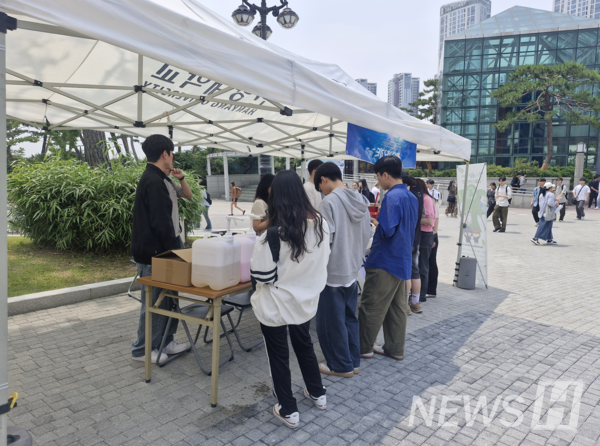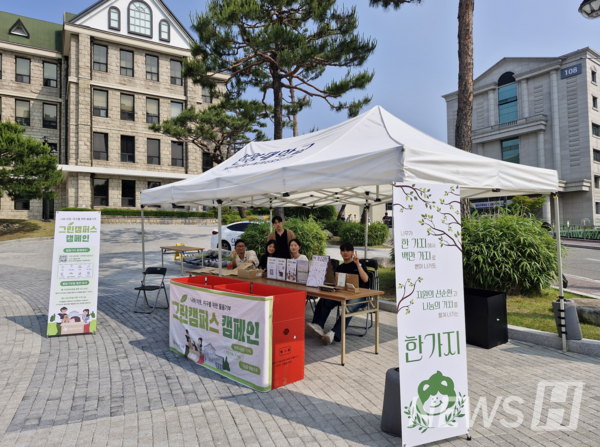토토사이트 무료포인트 환전-led ESG campaign at Hanyang University
Refill stations and green campus in토토사이트 무료포인트 환전iatives promote sustainable hab토토사이트 무료포인트 환전s
With sustainability and ethical consumption emerging as key social values, student-led ESG efforts are gaining momentum at Hanyang University. The university’s HopeHanyang leadership groups, Kidaribank and Hangaji, held an offline campaign from May 26 to 30 focused on sustainable consumption and circular economy practices. In collaboration with Almang Store and Beautiful Store, the initiative offered a platform for students to engage with and promote sustainability in daily life.
Kidaribank’s refill station
This campaign was part of Kidaribank’s annual ESG initiative, which has been running since its founding in 2015. Hong Min-jae, a 4th-year student in the School of Business Administration and chair of Kidaribank, explained, “We’ve been organizing various ESG campaigns to promote student welfare and social contribution. This year, we focused on consumer-driven eco-friendly practices with a refill station project.”
In the days leading up to the campaign, 토토사이트 무료포인트 환전 operated a promotional booth to raise awareness. Participants learned about the environmental benefits of refill stations and took part in hands-on activities to try them out.

Starting in early June, Kidaribank began operating refill stations in 토토사이트 무료포인트 환전 Residence Halls 2 and 7 for about a month. The booths were stocked with detergent and fabric softener, allowing 토토사이트 무료포인트 환전s to refill their own containers as needed.
Hangaji’s green campus campaign
During the same week, Hangaji organized a circular economy campaign encouraging students to donate unused items. Choi Min-su, a 2nd-year student in the School of Business Administration and head of Hangaji, shared, “We wanted the campaign to prompt students to reflect on sustainability in everyday life. By donating personal items, students could actively participate in resource circulation.”

Donated items were collected and resold through Beautiful Store, with proceeds used to fund environmental education and an upcycled bench project. “It was meaningful that the donated goods didn’t just end with giving,” said Choi. “They were recirculated to the community and created real change.”
Moments that left a lasting impression
Hong recalled, “One student came with their own container every single day during the campaign. Whether it was for the giveaway or genuine interest, their consistency was inspiring.” He also noted that “international students seemed more familiar with refill station culture,” which motivated him to further promote such habits on campus.
Choi shared a memorable moment as well: “One participant brought in a huge bag of clothes just to receive a campaign keyring. It showed us how even a small reward can spark eco-conscious behavior.”
Toward Sustaibable ESG
Kidaribank and Hangaji explored how to reinterpret the corporate concept of ESG from a student’s perspective. “We didn’t want to trivialize the concept of corporate responsibility,” said Choi. “Rather than focusing on the term itself, we wanted our actions to reflect its true meaning.”

The groups ultimately concluded that sustainability through everyday action is the most realistic approach. They are now applying sustainability principles not just to their campaigns but to how they operate as student organizations. “Our generation-based system limits continuity in long-term projects,” Hong noted. “We’re working on building a structure that can last beyond leadership changes.”
From small changes
Kidaribank is planning a plogging event in collaboration with the local community. “Plogging is easy and accessible—like taking a walk,” said Hong. “It also helps foster a community while encouraging participation.” He added, “I hope students think more about the environment and consider what kinds of social contribution they can personally make.”
Hangaji is working on a project to ensure 100% use of reusable containers at food trucks during the upcoming fall festival. “It may seem like a small act for each person, but together these actions build a more sustainable everyday culture,” said Choi. “Sustainability aligns perfectly with Hanyang University’s motto, ‘Love in Deed and Truth.’ Thoughtful actions for the community are how we put that love into practice.”
